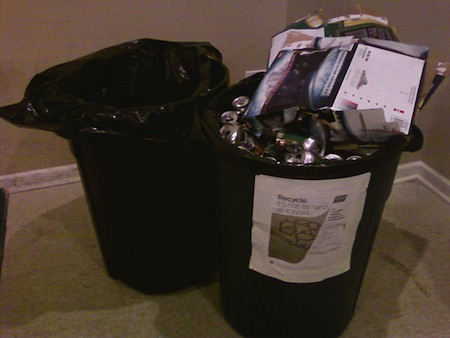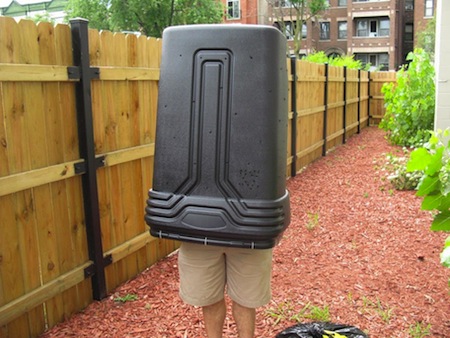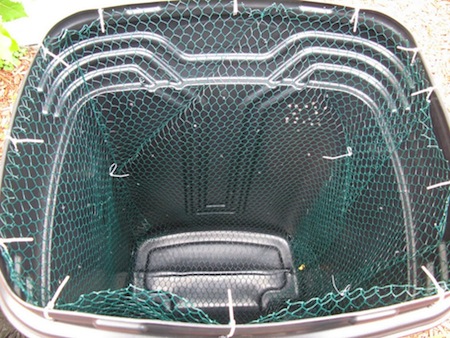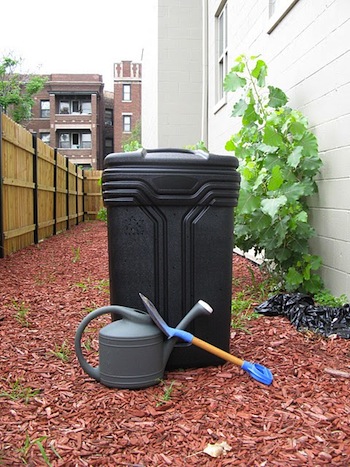Recently in SAGE Ambassadors Category
Guest post from Ari Epstein, a SAGE Ambassador and a fourth year in the College. Click here for part one of the series.
Once the school year began and more fraternity brothers returned to campus, I shifted my focus to fraternity-wide events like socials, parties, and the like. I often saw tons of aluminum cans and paper cartons lining the floors of rooms in which the fraternity hosted social activities, so I designated an old trash bin to be used only for recycling. I taped one of the SAGE recycling tip sheets to one side of the bin, while the other side has taped-on letters spelling "RECYCLING!". I also tried to avoid the unpleasant task of resorting recycles and non-recyclables during party clean-up shifts by placing recycling containers only where they are in highest demand. In order to avoid a space problem, I tried not to place recycling and garbage bins in the same rooms. Therefore, I placed recycling bins in the rooms where refreshments are served in recyclable containers, while I placed only garbage bins in the areas only serving refreshments in disposable cups.
Once the school year began and more fraternity brothers returned to campus, I shifted my focus to fraternity-wide events like socials, parties, and the like. I often saw tons of aluminum cans and paper cartons lining the floors of rooms in which the fraternity hosted social activities, so I designated an old trash bin to be used only for recycling. I taped one of the SAGE recycling tip sheets to one side of the bin, while the other side has taped-on letters spelling "RECYCLING!". I also tried to avoid the unpleasant task of resorting recycles and non-recyclables during party clean-up shifts by placing recycling containers only where they are in highest demand. In order to avoid a space problem, I tried not to place recycling and garbage bins in the same rooms. Therefore, I placed recycling bins in the rooms where refreshments are served in recyclable containers, while I placed only garbage bins in the areas only serving refreshments in disposable cups.

Overflowing recycling bin next to a trash can after a recent AEPi party
As the pictures demonstrate, not only do AEPi members spend less time sorting during clean-up shifts, but, in the rooms where I provided garbage and recycling bins without compromising space, party patrons generally sorted items without issue. Even more, other AEPi members donated old towels to use as mops and cleaning rags instead of paper towels. Since O-Week when we started using the towels, we have yet to use more than 1 roll of paper towels during four different cleaning shifts that covered nearly 4,000 square-feet of space.
A greener clean-up at AEPi
AEPi is committed to being a model for how other campus organizations can become more sustainable. To learn more about there efforts, contact Ari at aepstein11@uchicago.edu.
Guest post from Ari Epstein, a SAGE Ambassador and a fourth year in the College.
Before I became a SAGE Ambassador at the end of Spring Quarter last year, I contacted the Office of Sustainability on behalf of the Alpha Epsilon Pi (AEPi) fraternity. Because of my interest in reforming in-house and party practices to be more environmentally conscious, the fraternity elected me to institute pro-sustainability changes as co-house manager of our South Campus house.



Before I became a SAGE Ambassador at the end of Spring Quarter last year, I contacted the Office of Sustainability on behalf of the Alpha Epsilon Pi (AEPi) fraternity. Because of my interest in reforming in-house and party practices to be more environmentally conscious, the fraternity elected me to institute pro-sustainability changes as co-house manager of our South Campus house.
Ari Epstein of AEPi
Members of the Office of Sustainability made my task very easy by providing advice on gradually implementing reforms in a large social organization like a fraternity and information on electronic, print, and city resources. Despite the lack of higher quality of photos in this series, I am pleased to share AEPi's successful sustainability reforms with the University community in order to generate interest among other large social RSOs to reduce their carbon footprint and overall environmental impact and to streamline existing sustainability measures like recycling. 
Composting made fun

Ari lined the converted trash can with mesh to help keep pests at bay
Beginning shortly after my SAGE training, I introduced small changes to the fraternity by increasing in-house recycling, promoting awareness of electricity and water usage, and starting an aerobic composting bin made out of a converted 45-gallon plastic trash can lined with wire mesh (above). I now use old deli or produce bags to store fresh food scraps in the refrigerator until I bring down my weekly collection of waste and recyclables. Because I have a continuing ant problem and am cautious to develop a gnat problem, this system seems to work well.

The completed DIY compost bin next to AEPi's South Campus house
Click here to learn about AEPi's sustainable practices for social gatherings in part two of the series.
